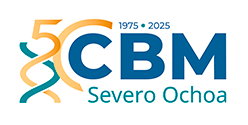Scientific facilities
Biocomputational analysis
Facility Head

Sandra González de la Fuente
Scientific Lead

Begoña Aguado Orea
Contact details
91 196 47 04
sabio (at) cbm.csic.es
Fees
At the Biocomputational Analysis Service (SABio) we specialize in providing state-of-the-art solutions for computational analysis of massive data, covering a wide range of technologies and applications. From meticulous selection of preprocessing and analysis methods to custom software development, our expert team is qualified to handle and integrate all types of multi-omics data.
- Technical scientific advice, experimental design, training to research groups with data analysis needs.
- Multiomics data analysis: massive sequencing (NGS), proteomics, metabolomics, etc.; omics integration, specific software development and biostatistical data analysis.
- Secure and confidential management of raw data acting as collaborators (“brokers”) of the European ENA repository (EBI-EMBL).
- Support to users in accessing CSIC scientific computing resources (NodoBio CCC, DRAGO).
We offer computational analysis of all types of massive data. Depending on the objectives, the technology used for data generation, types of samples and sample size and study organizations among others, we design the best method of data processing.
Advisory and training services
1. Technical advice: In any project for which we are asked to help, we meet with the researcher to understand their research objectives, the specific questions they wish to answer and the resources available for the project.
2. Interpretation of results: We collaborate with the user in the interpretation of the data obtained, identifying patterns, genetic variations, differential gene expression or other relevant characteristics depending on the project.
3. Results presentation: We send to the users detailed reports in English where results, methodology, graphs, tables and conclusions are included.
4. Monitoring and adjustments: We monitor the progress of the project and adjust the experimental design or methods of analysis as needed based on preliminary results.
5. Training: We provide high quality and customized training with the goal of providing users with the necessary skills and knowledge on massive sequencing data analysis, other omics data, and statistical data analysis. Our approach is based on understanding the individual needs of each user and we tailor the requested course by customizing it depending on the user’s objectives. We also offer training in the use of Ingenuity Pathway Analysis (IPA) path enrichment analysis software.
Advisory and training services
1. Technical advice: In any project for which we are asked to help, we meet with the researcher to understand their research objectives, the specific questions they wish to answer and the resources available for the project.
2. Interpretation of results: We collaborate with the user in the interpretation of the data obtained, identifying patterns, genetic variations, differential gene expression or other relevant characteristics depending on the project.
3. Results presentation: We send to the users detailed reports in English where results, methodology, graphs, tables and conclusions are included.
4. Monitoring and adjustments: We monitor the progress of the project and adjust the experimental design or methods of analysis as needed based on preliminary results.
5. Training: We provide high quality and customized training with the goal of providing users with the necessary skills and knowledge on massive sequencing data analysis, other omics data, and statistical data analysis. Our approach is based on understanding the individual needs of each user and we tailor the requested course by customizing it depending on the user’s objectives. We also offer training in the use of Ingenuity Pathway Analysis (IPA) path enrichment analysis software.
Experimental design services
1. Experimental Design: We provide assistance to the investigator in clearly defining the objectives of the study. We recommend the appropriate sequencing platform and technology for the project based on the objectives and budget available, taking into account the type and size of sample, study organism, necessary controls, sequencing strategy, read length and sequencing depth required. Depending on these detected needs, the generation of libraries and sequencing is outsourced, contacting different sequencing units to inform and advise the user on prices and strategies appropriate to their project. Once selected, the user is accompanied at all times, monitoring the process.
2. Technical Proposals for project applications: Helps researchers to prepare technical proposals (grant proposals) with the objective of requesting funds or resources to carry out a specific project where we include details on the experimental design, sequencing methods, data analysis, estimated budget and justification of the need and relevance of the project including data that justify the technique for the project.
Analysis services
– Selection of Preprocessing and Analysis Methods: We identify the tools and methods of preprocessing and data analysis suitable for the type of sequencing.
– Quality Control Planning: We define strategies for quality control of sequencing data, such as removal of low quality sequences, artifact detection and coverage assessment.
– Computational analysis of massive sequencing (NGS) data: re-sequencing (DNA-seq), de novo assembly, RNA-seq, ChIP-seq, ATAC-seq, CLIP-seq, Exome-seq, Ribo-seq, IsoSeq, Single-cell, metabolomics, 16S, 18S, ITS and other amplicon and shotgun metagenomics. Pathway enrichment analysis, search for germline or somatic variants, SNP/InDel, CNV and structural variants, microarrays, etc. Graphical representation of results in a customized way according to user requirements.
– Computational analysis of proteomics and metabolomics data: Multivariate statistical analysis of proteomics and metabolomics data, principal component analysis (PCA) or linear discrimination analysis (LDA) for clustering of samples depending on the expression of certain proteins/metabolites. Mapping of proteins/metabolites to known metabolic pathways to analyze differential profiles. Graphical representation of results in a customized way according to user requirements.
– Multiomics data integration analysis: Combination of NGS omics data such as genomics, transcriptomics, etc. with metabolomics and proteomics data for complete understanding of biological processes. Machine learning analysis to build predictive models. Graphical representation of results in a customized way according to user requirements.
– Development, implementation and creation of customized software for data analysis: Programming in different languages according to the needs of the Service (Phyton, R, Bash, Tcsh, etc.) to develop ad hoc scripts.
– Statistical analysis of experimental data: exploratory analysis, hypothesis testing with parametric and non-parametric methods, robust statistical methods, ANOVA, principal component analysis (PCA), data mining (machine learning), ROC curves, etc. Graphical representation of results in a customized way according to user requirements.
– Sending sequences to European repositories, specifically to the European Nucleotide Archive (ENA) and European Genome-phenome Archive (EGA) belonging to the European Bioinformatics Institute (EBI). It is a secure and confidential way of maintaining the data, in addition to being an essential requirement when publishing the results in scientific journals. As collaborating users of ENA (Brokers), we take care of the maintenance of the data, as well as renewing the privacy of the data.
Staff

María Santos Galindo
Lab.: 313.2 Ext.: 4704
msantos(at)cbm.csic.es

Sandra González de la Fuente
Lab.: 313.2 Ext.: 4704
sandra.g(at)cbm.csic.es

Eva Sacristán Horcajada
Lab.: 312.2 Ext.: 4704
esacristan(at)cbm.csic.es

Paula Martínez García
Lab.: 313.2 Ext.: 4704
paula.martinez(at)cbm.csic.es

María Santos Romero
Lab.: 313.2 Ext.: 4704
msromero(at)cbm.csic.es
